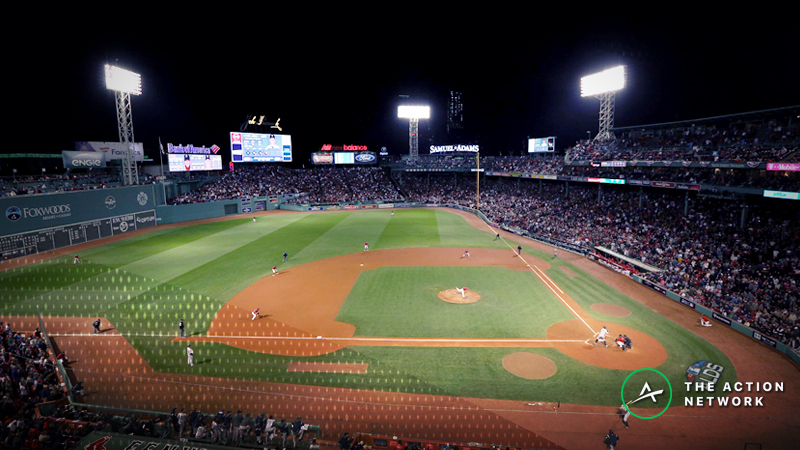- Home-field advantage tends to be overvalued by bettors in the divisional and championship rounds, but is that also the case for the World Series?
- We take a historical betting focused look of the home-road splits of MLB's Fall Classic to see if the opposing League rules provides an edge.
Two historic franchises in the Dodgers and Red Sox will begin battle in a mouth-watering World Series matchup tonight. While most break down the on-field matchups, I wanted to take some time to focus on the two legendary parks (Fenway Park and Dodger Stadium) these teams will play in.
Does home-field advantage mean any more or less in the World Series than it does the rest of the season?
Historical Perspective
MLB home teams only win 54% of their overall games, which is the lowest of all four major sports. That percentage implies that the crowd, umpire bias, weather, park familiarity, player routine, ability to bat last and other factors swing the result in only one out of every 12 or so games in the favor of the home team.
Per Sports Reference, home teams in the NBA and NFL both won at least 5% more games in the postseason. Conversely, NHL and MLB teams haven't seen any historical "bump" in the playoffs.
Just take a look at this year's playoffs. Road teams actually have a winning record of 14-13. And if you recall all of the teams that we watched get eliminated in this year's postseason:
- Cubs
- Athletics
- Rockies
- Yankees
- Indians
- Braves
- Brewers
- Astros
Seven of those eight teams were eliminated on their home field!
However, that does not apply to the World Series, which has actually provided a historical performance jump for home teams. Just take a look at these historical results, split into periods that had distinct format changes.
Since the American League and National League expanded (and MLB expanded playoffs) in 1969, home teams have won 60% of World Series games but only 52% of Division Series contests. That's great news for a Red Sox team that has won nine straight postseason series with home-field advantage — a streak that dates back to 1990.
If you go back even further, teams with home-field advantage have won 58% of Fall Classics since 1925. In contrast, teams with home-field advantage have only won ~52% of League Division Series (50-46) since the post-strike realignment in 1995.
Home teams have enjoyed the most success in Game 1 of the World Series, having gone 58-34 since 1925. That's a stunning 63% winning percentage.
Some of you might be thinking that the better team usually has home-field advantage, which would explain that high clip. However, that's not the case with baseball. Team performance did not determine World Series home-field advantage in most years. There also hasn't been any strong correlation between better record and World Series outcomes.
Rules Matter
The next natural question is why? You could make many arguments for why home-field means more on the sport's biggest stage, but I think it comes down to the different rules in each League. American League teams are better equipped to play with a DH, while NL teams have a slight edge managing a game without one in their home parks.
Look no further than the very normal World Series home winning percentage of 53.6% prior to the adoption of the Designated Hitter. That's right in line with the historical regular season percentage. (Teams used the DH for the first time in the 1976 World Series — although the AL adopted it in 1973.)
For reference, AL and NL teams have won approximately 57% and 52% of almost 2,900 home Interleague regular season games, respectively.
Interestingly, Boston's 132-71 (0.65) home Interleague record is the best of any MLB franchise. The Dodgers have also been successful at home in IL play, compiling an NL-best 106-78 (.576) record.
Betting Results
From a betting perspective, home teams are 41-31 56.9% (2.4% ROI) since 2005, with no discernible difference between AL (21-16) and NL (20-15) results.
While road underdogs have been a profitable postseason bet, that hasn't been the case in the Fall Classic. World Series road underdogs are just 19-32 since 2005 for a subpar -11.2% ROI.
There appears to be a few additional percentage points' worth of edge for home teams in the World Series. I don't think it's a 5% bump like we see in the NFL or NBA postseason, but a 2.5% bump (from the normal 54%) seems fair considering some of the unique factors at play and what we've seen historically. That implies home teams should be -130 in the World Series — with all else being equal.
Having said that, the Dodgers were better on the road than they were at home this season, and home teams in Game 7 of the World Series actually own an overall losing record (19-20) after the Cubs and Astros won the past two winner-take-all games on the road. Can't predict baseball.




































